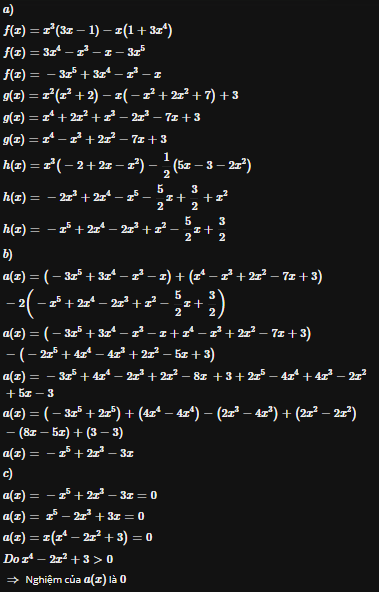
Hãy nhập câu hỏi của bạn vào đây, nếu là tài khoản VIP, bạn sẽ được ưu tiên trả lời.


cho B(x) = 0
\(=>-5x+30=0\Rightarrow-5x=-30\Rightarrow x=6\)
cho E(x) = 0
\(=>x^2-81=0\Rightarrow x^2=81=>\left[{}\begin{matrix}x=9\\x=-9\end{matrix}\right.\)
cho C(x) = 0
\(=>2x+\dfrac{1}{3}=0=>2x=-\dfrac{1}{3}=>x=-\dfrac{1}{6}\)
bạn tham khảo hai câu này nha vì mình ko biết là mấy câu còn lại
B(x)=-5x+30
cho B(x)=0
=> -5x+30=0
-5x=-30
x=-30:(-5)
x=-6
* Vậy nghiệm của đa thức B(x) là -6.
C(x)=2x+1/3
cho C(x)=0
=>2x+1/3=0
2x=-1/3
x=-1/3:2
x=-1/6
vậy nghiệm của đa thức C(x) là -1/6.

\(a)\)
\(f\left(x\right)=2x.\left(x^2-3\right)-4.\left(1-2x\right)+x^2.\left(x-2\right)+\left(5x+3\right)\)\(=2x^3-6x-4+8x+x^3-2x^2+5x+3=3x^3+7x-1-2x^2=3x^3-2x^2+7x-1\)\(g\left(x\right)=-3.\left(1-x^2\right)-2.\left(x^2-2x-1\right)=-3+3x^2-2x^2+4x+2=-1+x^2+4x=x^2+4x-1\)
\(b)\)
\(h\left(x\right)=f\left(x\right)-g\left(x\right)=\left(3x^3-2x^2+7x-1\right)-\left(-1+x^2+4x\right)=x^2+4x-1=3x^3-2x^2+7x-1+1-x^2-4x=3x^3-3x^2+3x\)
\(\text{Xét}:\)
\(3x^3-3x^2+3x=0\)
\(\rightarrow3x.\left(x^2-x+1\right)=0\)
\(\rightarrow x.\left(x^2-x+1\right)=0\)
\(\rightarrow\orbr{\begin{cases}3x.\left(x^2-x+1\right)=0\\x.\left(x^2-x+1\right)=0\end{cases}}\) \(\rightarrow\orbr{\begin{cases}x=0\\x^2-x+1=0\end{cases}}\)
\(\rightarrow\orbr{\begin{cases}x=0\\x\notinℝ\end{cases}}\) \(\rightarrow x=0\)
\(\text{Vậy nghiệm của}\)\(h\left(x\right)\)\(\text{là}:\)\(0\)

1: f(-1)=0
=>1+m-1+3m-2=0 và
=>4m-2=0
=>m=1/2
2: g(2)=0
=>2^2-4(m+1)-5m+1=0
=>4-5m+1-4m-4=0
=>-9m+1=0
=>m=1/9
4: f(1)=g(2)
=>1-(m-1)+3m-2=4-4(m+1)-5m+1
=>1-m+1+3m-2=4-4m-4-5m+1
=>2m-2=-9m+1
=>11m=3
=>m=3/11
3:
H(-1)=0
=>-2-m-7m+3=0
=>-8m=-1
=>m=1/8
5: g(1)=h(-2)
=>1-2(m+1)-5m+1=-8-2m-7m+3
=>-5m+2-2m-2=-9m-5
=>-7m=-9m-5
=>2m=-5
=>m=-5/2

a)Đặt A (x) = 0
hay \(3x-6=0\)
\(3x\) \(=6\)
\(x\) \(=6:3\)
\(x\) \(=2\)
Vậy \(x=2\) là nghiệm của A (x)
b) Đặt B (x) = 0
hay \(2x-10=0\)
\(2x\) \(=10\)
\(x\) \(=10:2\)
\(x\) \(=5\)
Vậy \(x=5\) là nghiệm của B (x)
c) Đặt C (x) = 0
hay \(x^2-1=0\)
\(x^2\) \(=1\)
\(x^2\) \(=1:1\)
\(x^2\) \(=1\)
\(x\) \(=\overset{+}{-}1\)
Vậy \(x=1;x=-1\) là nghiệm của C (x)
d) Đặt D (x) = 0
hay \(\left(x-2\right).\left(x+3\right)=0\)
⇒ \(x-2=0\) hoặc \(x+3=0\)
* \(x-2=0\) * \(x+3=0\)
\(x\) \(=0+2\) \(x\) \(=0-3\)
\(x\) \(=2\) \(x\) \(=-3\)
Vậy \(x=2\) hoặc \(x=-3\) là nghiệm của D (x)
e) Đặt E (x) = 0
hay \(x^2-2x=0\)
⇔\(\left[{}\begin{matrix}x^2-2x\\\left(x-2\right)x\end{matrix}\right.\)
⇒\(\left(x-2\right)x\)
⇔ \(x.\left(2x-1\right)=0\)
⇔ \(\left[{}\begin{matrix}x=0\\2x-1=0\end{matrix}\right.\)
\(\left\{{}\begin{matrix}x=0\\x=2\end{matrix}\right.\)
Vậy \(x=0\) hoặc \(x=2\) là nghiệm của E (x)
f) Đặt F (x) = 0
hay \(\left(x^2\right)+2=0\)
\(x^2\) \(=0-2\)
\(x^2\) \(=-2\)
\(x\) \(=\overset{-}{+}-2\)
Do \(\overset{+}{-}-2\) không bằng 0 nên F (x) không có nghiệm
Vậy đa thức F (x) không có nghiệm
g) Đặt G (x) = 0
hay \(x^3-4x=0\)
⇔\(\left[{}\begin{matrix}x^3-4x\\\left(x-4\right)x^2\end{matrix}\right.\)
⇒ \(\left(x-4\right)x^2=0\)
⇔ \(x.\left(4x-1\right)=0\)
⇔\(\left[{}\begin{matrix}x=0\\4x-1=0\end{matrix}\right.\)
\(\left\{{}\begin{matrix}x=0\\x=\dfrac{1}{4}\end{matrix}\right.\)
Vậy \(x=0\) hoặc \(x=\dfrac{1}{4}\) là nghiệm của G (x)
h) Đặt H (x) = 0
hay \(3-2x=0\)
\(2x\) \(=3+0\)
\(2x\) \(=3\)
\(x\) \(=3:2\)
\(x\) \(=\dfrac{3}{2}\)
Vậy \(x=\dfrac{3}{2}\) là nghiệm của H (x)
CÂU G) MIK KHÔNG BIẾT CÓ 2 NGHIỆM HAY LÀ 3 NGHIỆM NỮA

a, \(f\left(x\right)=\left(2-x\right)\left(x-1\right)\)
\(=2x-2-x^2+x\)
\(=-x^2+3x-2\)
\(=-\left(x^2-\dfrac{3}{2}x.2+\dfrac{9}{4}-\dfrac{1}{4}\right)\)
\(=-\left[\left(x-\dfrac{3}{2}\right)^2-\dfrac{1}{4}\right]\)
\(=-\left(x-\dfrac{3}{2}\right)^2+\dfrac{1}{4}\le\dfrac{1}{4}\)
Dấu " = " xảy ra khi \(-\left(x-\dfrac{3}{2}\right)^2=0\Leftrightarrow x=\dfrac{3}{2}\)
Vậy \(MAX_{f\left(x\right)}=\dfrac{1}{4}\) khi \(x=\dfrac{3}{2}\)
b, tương tự
c, \(h\left(x\right)=2x-3-x^2\)
\(=-\left(x^2-2x+3\right)\)
\(=-\left(x^2-2x+1+2\right)\)
\(=-\left[\left(x-1\right)^2+2\right]\)
\(=-\left(x-1\right)^2-2\le-2\)
Dấu " = " khi \(-\left(x-1\right)^2=0\Leftrightarrow x=1\)
Vậy \(MAX_{h\left(x\right)}=-2\) khi x = 1
\(f\left(x\right)=\left(2-x\right)\left(x-1\right)\)
\(=-x^2+3x-2\)
\(=-\left(x^2-3x+2\right)\)
\(=-\left(x^2-\dfrac{3}{2}x-\dfrac{3}{2}x+2\right)\)
\(=-\left(x^2-\dfrac{3}{2}x-\dfrac{3}{2}x+\dfrac{9}{4}-\dfrac{1}{4}\right)\)
\(=-\left[x\left(x-\dfrac{3}{2}\right)-\dfrac{3}{2}\left(x-\dfrac{3}{2}\right)-\dfrac{1}{4}\right]\)
\(=-\left[\left(x-\dfrac{3}{2}\right)^2-\dfrac{1}{4}\right]\)
\(=-\left(x-\dfrac{3}{2}\right)^2+\dfrac{1}{4}\)
Vì \(-\left(x-\dfrac{3}{2}\right)^2\le0\Rightarrow-\left(x-\dfrac{3}{2}\right)^2+\dfrac{1}{4}\le\dfrac{1}{4}\)
\(\Rightarrow f\left(x\right)\le\dfrac{1}{4}\)
Dấu "=" xảy ra khi \(-\left(x-\dfrac{3}{2}\right)^2=0\)
\(\Rightarrow x=\dfrac{3}{2}.\)
Vậy \(Max_{f\left(x\right)}=\dfrac{1}{4}\) khi \(x=\dfrac{3}{2}.\)
Mấy câu kia tương tự.